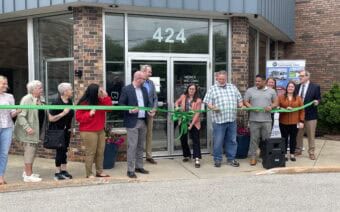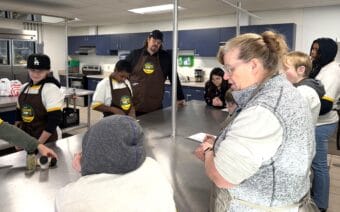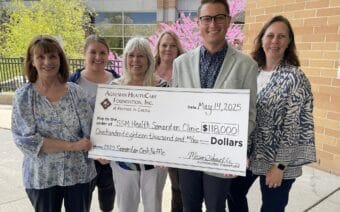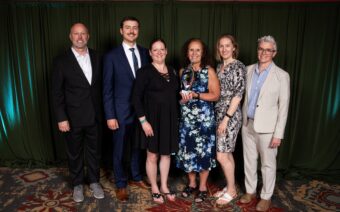
February 21, 2024
NORTHEAST WISCONSIN — The American Red Cross, the nation’s largest blood supplier,announced earlier this year that the United States was facing an emergency blood shortage as it experienced the lowest number of people giving blood in the last 20 years.
“A person needs lifesaving blood every two seconds in our country — and its availability can be the difference between life and death,” Pampee Young, M.D., chief medical officer of the American Red Cross, said. “However, blood is only available thanks to the generosity of those who roll up a sleeve to donate.”
Rebecca Rockhill — executive director of the Northeast Wisconsin Region Chapter of the American Red Cross, based in Green Bay — said there are ways businesses in the region can help make a difference.
According to Rockhill and John Hagins, president and CEO of The Community Blood Center (CBC) in Appleton, business support is critical to meeting the need for blood.
Rockhill said a business that hosts a blood drive “takes away that piece of ‘I don’t have time’ (to donate response).”

Rebecca Rockhill
“They have that audience right there,” she said.
Rockhill said businesses are a “phenomenally important” part of the puzzle because the majority of blood donated to the Red Cross comes from on-site blood drives at businesses or nonprofits, churches and other locations.
She said the Northeast Region of the Red Cross has one “fixed site” for blood donations at 2131 Deckner Ave. in Green Bay.
Rockhill said a Red Cross blood donation goes “wherever it is needed.”
“If it can stay local, that’s the best,” she said. “But if there’s a disaster, it goes where it is needed.”
Hagins said before the COVID-19 pandemic, 70% of CBC’s blood donations came from community blood drives.
He said that almost reversed during the pandemic — with the majority of blood being donated at permanent CBC sites.
“And it makes sense- people weren’t in their offices,” he said.
Describing CBC as a “business to business organization,” Hagins said CBC has “rebounded” to 50% of its donations being made at blood drives.

John Hagins
“We’ve had to pivot as the business environment has changed- so we can reach people where they are,” he said.
Post-pandemic, Hagins said CBC is still working to understand the new work environments.
“It certainly is not the way it was,” he said.
Founded in 1955, Hagins said the CBC supports the blood needs of more than 40 Wisconsin hospitals — and operates donor centers in Appleton, Oshkosh, Little Chute and Woodruff, as well as fixed sites in Rhinelander and Merrill.
Hagins said CBC is opening a new location in Green Bay at 1241 Lombardi Access Road, Suite H — with appointments available starting March 5.
“We’re going to open this site with a donor mixed reality experience, so we’ll have headsets the donor can wear during the donation process,” he said.
Hagins said CBC also plans to open a donation site in Chicago in late March.
This location, he said, was sparked by CBC’s partnership with the University of Chicago Medical Center to collect blood donations in Chicago, with the mission of making a difference for patients suffering from sickle cell anemia, which disproportionately impacts the African American community.
“Sickle cell disease causes acute episodes of pain, and one of the primary ways patients can have some relief is blood transfusions,” he said.
The next generation
Though the pandemic was a major contributor to the blood shortages the nation is currently experiencing, Hagins said there are other factors as well.
He said many of the donors have been and are in the Baby Boomer generation.
“They felt it was their civic city and a patriotic duty to donate blood for the community,” he said.
The aging of this generation, Hagins said, has caused some decrease in donors.
“And more and more folks who are in the Baby Boomer generation are going to need to rely on blood products as they advance in age,” he said.
Where blood centers struggle, Hagins said, is in finding ways to engage the next generation of blood donors.
“Those I would say are under the age of 40,” he said. “It’s the next largest age group moving through, and replacing some of those blood donors who we have lost in the Baby Boomer generation.”
With blood donations, Hagins said, “we deal in supply and demand all the time.”
“It’s a precious gift,” he said. “It has to come from a person — there is no substitute for it.”
In 2021, Hagins said there were an estimated 11.8 million red cell collections, which includes all ways of collecting blood.
“They all get used,” he said. “It’s a perishable product, so there’s an expiration date — (which is generally 42 days after blood donation). It’s imperative we have people continuously donate.”
With that said, Hagins said very few red cell products end up expiring “because there’s such a demand right now.”
Rockhill said encouraging a commitment to “humanitarian giving,” is a great way to promote blood donation when it comes to the younger population.

At any one time, Rebecca Rockhill said the Northeast Wisconsin Region of the American Red Cross has on average, 30 donor events listed by zip code on its website. Submitted Photo
“It’s so easy and convenient to do it, and that’s the message that needs to be shared,” she said.
Currently, at any one time, Rockhill said the Northeast Wisconsin Region of the American Red Cross has on average 30 donor events listed by zip code on its website.
“There’s never a reason for someone not to find a drive,” she said.
The 16-county Northeast Wisconsin region extends to include three counties in the Upper Peninsula of Michigan and as far south as Sheboygan and Fond du Lac counties, and as far west as Waupaca and Waushara counties.
Rockhill said active blood donors also need to tell their stories to encourage new donors to make donating blood a part of their routine up to six times each year.
“As we get out more information, and we are talking to people about the process- the more likely we are going to have individuals go,” she said.
A consistent worry, Rockhill said folks have, is the time commitment.
“Most people can get through the entire process within an hour,” she said.
The actual donation, she said, takes less than 20 minutes.
“(The more) convenient we can make it, the more we will see individuals donating,” she said.
Rockhill said the goal is for blood donation to become a habit.
“This is why we’re getting into the high schools, and we are educating at a younger age and making it easier for 16-year-olds (who need parental permission) to give,” she said.
At age 17, students can donate blood without parental permission.
Hagins said an estimated 3% of the U.S. population donates blood each year.
“If 1% more donated, blood shortages could be alleviated,” he said. “We have to start somewhere — we can start here in our own corner of the world.”
As mentioned previously, Hagins said a piece of that puzzle is business-hosted blood drives.
“We make it easy,” he said. “We work directly with the business (to help them plan and create a blood drive).”
Manufacturing companies, Hagins said, make good blood drive hosts because most employees work on-site.
“It’s a great way to engage an organization and a company positively,” he said.
If an employee isn’t eligible to donate, Hagins said they can still get involved by helping register donors, volunteering in the refreshment area or encouraging others to donate.
“In the end, the feeling you get for helping somebody else who you will never know is all worth it,” he said.
Area businesses step up
Wendy Suprise, a senior materials supervisor at Miller Electric in Appleton, said Miller Electric hosted its first Red Cross blood drive last February.
“I think we had 40 pints collected, and we had 50 participants,” she said.
Since joining the Northeast Wisconsin Region of the American Red Cross’ board of directors, Suprise said “I’ve been trying to get the Red Cross into Miller.”
“People enjoy it,” she said. “A lot of the manufacturing people will come and do it- They’ll take an hour and a half out of the day to go donate.”
Suprise said Miller hosts drives at one of its eight Appleton locations.

John Hagins said the blood donation centers can help businesses with all aspects of blood drive planning, making it an easy process for all. Submitted Photo
“I think people feel good about it,” she said. “They’re giving back to the community- We’re focused on giving back to the community.”
That same focus, Meredith Baciak, said can be found at Miron Construction.
“One of the biggest things with our company is that we serve the communities in which we live and work,” Baciak, wellness coordinator for Miron Construction, said. “We are out in the community with our buildings and, yes, we build buildings, but it’s about the people.”
Among the company’s core values, Baciak said, are “rally together” and “stay grounded.”
“The meaning of that is getting involved, responding with urgency and responding as a team — extending a helping hand wherever we can,” she said. “If there’s a blood shortage, we’re going to rally together and give back whenever we can.”
Baciak said Miron hosts CBC blood drives at its Neenah main office, warehouse and yard, and then at the Titletown office (in the U.S. Venture building) in Green Bay.
“We have (drives) scheduled for the entire year,” she said.
Hosting drives in the summer months — during the company’s summer internship program and when many students are home from college — Baciak said helps Miron reach that younger generation of potential donors.
“I get a lot of them to sign up to align with our younger work population,” she said. “I’m thankful for all the employees. They shift their schedules around and meetings around (our drives).”
Senior Engineer Jason Fetting said the CBC organizes quarterly blood drives at Kimberly-Clark Corporation in Neenah.
“They’re driven by people who are passionate about it,” he said.
Fetting said blood drives are held at three locations: the Kimberly-Clark west offices, the Neenah cold spring facility and the X-Mill, the site of experimental work.
“We try to do it on different days so people have different opportunities,” he said. “We try to do it when a lot of people are going to be in the office. We try to pick days when a big meeting might be going on in the office.”
Fetting, 55, said he started donating blood when he was in high school, after being inspired by his parents who “were always blood donors.”
Honoring the one you love
Cameron Teske, vice president of visitor experiences for Discover Green Bay, said he is familiar with the CBC blood donation bus.
Cameron has hosted a blood drive through the CBC since 2019, in honor of his wife, Lauren, who passed away from breast cancer in 2018.
This past November, Cameron said he hosted the Lauren Teske Memorial Blood Drive for the first time at the new Discover Green Bay visitors’ center at 1945 Argonne St., just off the Lombardi Avenue exit from Interstate 41.
Cameron said his wife received multiple blood transfusions when her blood counts were too low to receive chemotherapy.
Before that, Cameron said, “I thought the people who needed blood were people who physically lost blood.”
As a donor, Cameron said he has the mentality that his donation “could be going to a neighbor or a friend of a friend.”
“It could be benefiting someone I know,” he said. “Giving blood is a relatively free way to give back to people and benefits someone who needs something — literally a life-saving gift.”
Cameron said hosting blood drives was his way of giving back to what his family had received.
“I believe everything happens for a reason — my family was dealt a rough hand-,” he said. “You can’t change a rough situation- It’s taking a bad situation and making something good out of it.”
Speaking from personal experience, Cameron said hosting a blood drive isn’t difficult.
“(The donation centers) give you all of the marketing materials, all of the details — anything you need to make it a successful blood drive,” he said. “Especially a business where you want people to walk through your doors, why wouldn’t you host a blood drive?- It costs you nothing other than a little bit of time and the physical space for you to do something.”
Present at many of the drives held in his mom’s honor, Cameron said their son, Brekken, now eight, “wants to know when he can donate blood.”
“That’s his take — you’re helping people who are sick,” he said. “As you see people coming together to donate blood- it shows you there are great people in the world who want to help. I saw so much blood (Lauren) received from donors who had no idea who she was- the love for humanity for somebody else (is inspiring).”
For more information on hosting a blood drive, visit communityblood.org or redcrossblood.org.
 Powering forward with solar energy
Powering forward with solar energy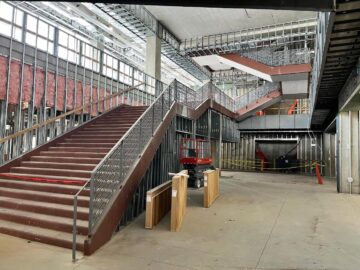 Daigle Brothers – Building Wisconsin one steel column at a time
Daigle Brothers – Building Wisconsin one steel column at a time


